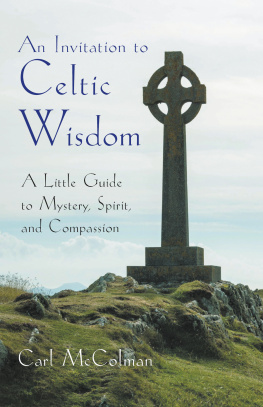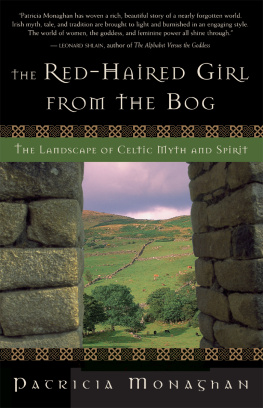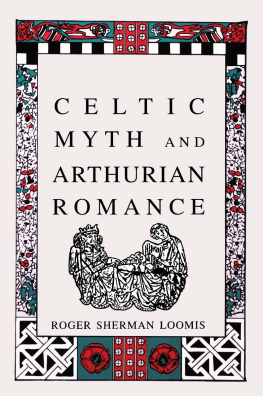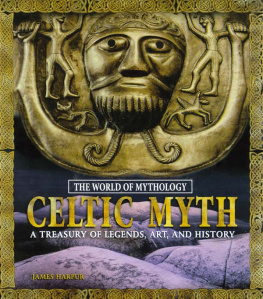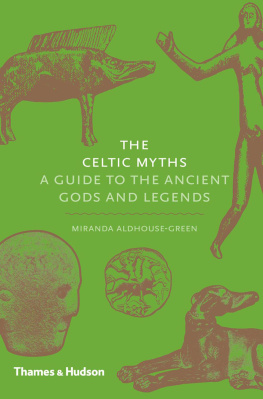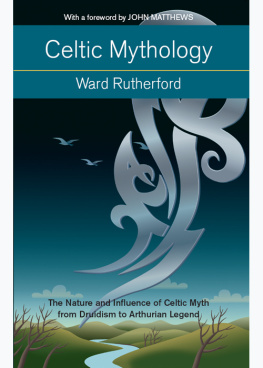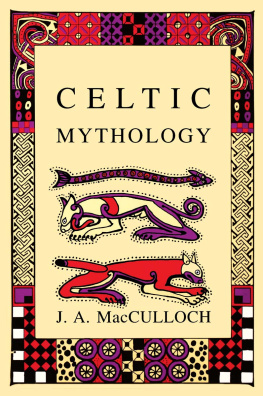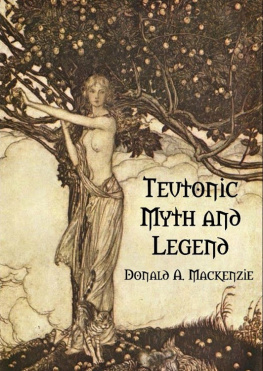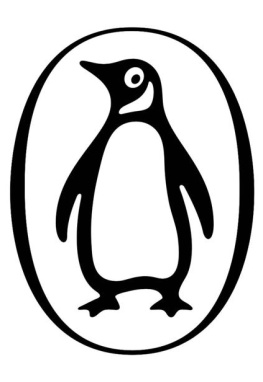Bibliographical Note
This Dover edition, first published in 2003, is an unabridged republication of the text of the work first published by The Gresham Publishing Company, London, c. 1910, under the title Celtic Myth & Legend, Poetry & Romance. The first edition was published by Blackie and Son, Limited, London, in 1905 under the title The Mythology of the British Islands.
Library of Congress Cataloging-in-Publication Data
Squire, Charles.
[Mythology of the British Islands]
Celtic myth and legend / Charles Squire. p. cm.
Originally published under title: The mythology of the British Islands. London : Blackie and Son, 1905.
Includes index.
9780486122090
1. Mythology, Celtic. 2. CeltsFolklore. I. Title.
BL900 .S6 2003
299.16dc21
2002031508
Manufactured in the United States of America
Dover Publications, Inc., 31 East 2nd Street, Mineola, N.Y 11501
PREFACE
This book is what its author believes to be the only attempt yet made to put the English reader into possession, in clear, compact, and what it is hoped may prove agreeable, form, of the mythical, legendary, and poetic traditions of the earliest inhabitants of our islands who have left us written recordsthe Gaelic and the British Celts. It is true that admirable translations and paraphrases of much of Gaelic mythical saga have been recently published, and that Lady Charlotte Guests translation of the Mabinogion has been placed within the reach of the least wealthy reader. But these books not merely each cover a portion only of the whole ground, but, in addition, contain little elucidatory matter. Their characters stand isolated and unexplained; and the details that would explain them must be sought for with considerable trouble in the lectures and essays of scholars to learned societies. The reader to whom this literature is entirely new is introduced, as it were, to numerous people of whose antecedents he knows nothing; and the effect is often disconcerting enough to make him lay down the volume in despair.
But here he will at last make the formal acquaintance of all the chief characters of Celtic myth: of the Gaelic gods and the giants against whom they struggled; of the Champions of the Red Branch of Ulster, heroes of a martial epopee almost worthy to be placed beside the tale of Troy divine; and of Finn and his Fenians. He will meet also with the divine and heroic personages of the ancient Britons: with their earliest gods, kin to the members of the Gaelic Pantheon; as well as with Arthur and his Knights, whom he will recognize as no mortal champions, but belonging to the same mythic company. Of all these mighty figures the histories will be briefly recorded, from the time of their unquestioned godhood, through their various transformations, to the last doubtful, dying recognition of them in the present day, as fairies . Thus the volume will form a kind of handbook to a subject of growing importancethe so-called Celtic Renaissance, which is, after all, no moreand, indeed, no lessthan an endeavour to refresh the vitality of English poetry at its most ancient native fount.
The book does not, of course, profess to be for Celtic scholars, to whom, indeed, its author himself owes all that is within it. It aims only at interesting the reader familiar with the mythologies of Greece, Rome, and Scandinavia in another, and a nearer, source of poetry. Its authors wish is to offer those who have fallen, or will fall, under the attraction of Celtic legend and romance, just such a volume as he himself would once have welcomed, and for which he sought in vain. It is his hope that, in choosing from the considerable, though scattered, translations and commentaries of students of Old Gaelic and Old Welsh, he has chosen wisely, and that his readers will be able, should they wish, to use his book as a stepping-stone to the authorities themselves. To that end it is wholly directed; and its marginal notes and short bibliographical appendix follow the same plan. They do not aspire to anything like completeness, but only to point out the chief sources from which he himself has drawn.
To acknowledge, as far as possible, such debts is now the authors pleasing duty. First and foremost, he has relied upon the volumes of M. H. dArbois de Jubainvilles Cours de Littrature celtique, and the Hibbert Lectures for 1886 of John Rhys, Professor of Celtic in the University of Oxford, with their sequel entitled Studies in the Arthurian Legend. From the writings of Mr. Alfred Nutt he has also obtained much help. With regard to direct translations, it seems almost superfluous to refer to Lady Charlotte Guests Mabinogion and Mr. W. F. Skenes Four Ancient Books of Wales, or to the work of such well-known Gaelic scholars as Mr. Eugene OCurry, Dr. Kuno Meyer, Dr. Whitley Stokes, Dr. Ernest Windisch, Mr. Standish Hayes OGrady (to mention no others), as contained in such publications as the Revue Celtique, the Atlantis, and the Transactions of the Ossianic Society, in Mr. OGradys Silva Gadelica, Mr. Nutts Voyage of Bran, Son of Febal, and Miss Hulls Cuchullin Saga. But space is lacking to do justice to all. The reader is referred to the marginal notes and the Appendix for the works of these and other authors, who will no doubt pardon the use made of their researches to one whose sole object has been to gain a larger audience for the studies they have most at heart.
Finally, perhaps, a word should be said upon that vexed question, the transliteration of Gaelic. As yet there is no universal or consistent method of spelling. The author has therefore chosen the forms which seemed most familiar to himself, hoping in that way to best serve the uses of others.
CHAPTER I
THE INTEREST AND IMPORTANCE OF CELTIC MYTHOLOGY
It should hardly be necessary to remind the reader of what profound interest and value to every nation are its earliest legendary and poetical records. The beautiful myths of Greece form a sufficing example. In threefold manner, they have influenced the destiny of the people that created them, and of the country of which they were the imagined theatre. First, in the ages in which they were still fresh, belief and pride in them were powerful enough to bring scattered tribes into confederation. Secondly, they gave the inspiration to sculptor and poet of an art and literature unsurpassed, if not unequalled, by any other age or race. Lastly, when the glory that was Greece had faded, and her people had, by dint of successive invasions, perhaps even ceased to have any right to call themselves Hellenes, they have passed over into the literatures of the modern world, and so given to Greece herself a poetic interest that still makes a petty kingdom of greater account in the eyes of its compeers than many others far superior to it in extent and resources.
This permeating influence of the Greek poetical mythology, apparent in all civilized countries, has acted especially upon our own. From almost the very dawn of English literature, the Greek stories of gods and heroes have formed a large part of the stock-in-trade of English poets. The inhabitants of Olympus occupy, under their better-known Latin names, almost as great a space in English poetry as they did in that of the countries to which they were native. From Chaucer downwards, they have captivated the imagination alike of the poets and their hearers. The magic cauldron of classic myth fed, like the Celtic Grail, all who came to it for sustenance.




